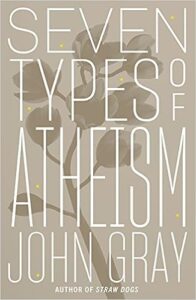John Gray is an English philosopher and author. Gray retired in 2008 from his position as School Professor of European Thought at the London School of Economics and Political Science.

In this episode of EconTalk, host Russ Roberts hosts John Gray for a conversation on Gray’s book Seven Types of Atheism. Human progress is illusory, Gray says, just one of his radical views in measuring the modern state of religion and atheism. How do Gray’s ideas strike you? Let us know your thoughts below; we love to hear from you.
Roberts and Gray discuss the purpose of religion as opposed to science, suggesting religion and stories like Adam and Eve are not meant to be literal.
Why was religion created? What is the relationship between religion and science; are they necessarily at odds with one another? How should Bible stories be read?
In Gray’s atheistic view, he denies the existence of a creator god, and with this simple gloss, he says the lines between atheism and religion are blurred. Buddhism and polytheism do not have creator gods. Can someone be atheistic and follow one of these religions/ways of life? What does atheism mean to you?
Gray is cynical about human progress; it’s an illusion, he says. Is progress within science progress within the quality of civilization? How does the advancement of knowledge and technology influence our notion of ‘progress’? Do you agree with Gray that quality within our civilization has remained stagnant?
Can humans improve and transform themselves? Gray is skeptical of human self-improvement, which he believes cannot exist without a world of stability. Does self-improvement have only short-term effects? Can people ever realize their authentic selves?
Gray and Roberts discuss the tendency for people to look down upon those who are religious as being unintelligent or ignorant. To what extent will religion fade away as people become smarter? Is religion an antidote to credulity as Gray says it is?


Comments are closed.